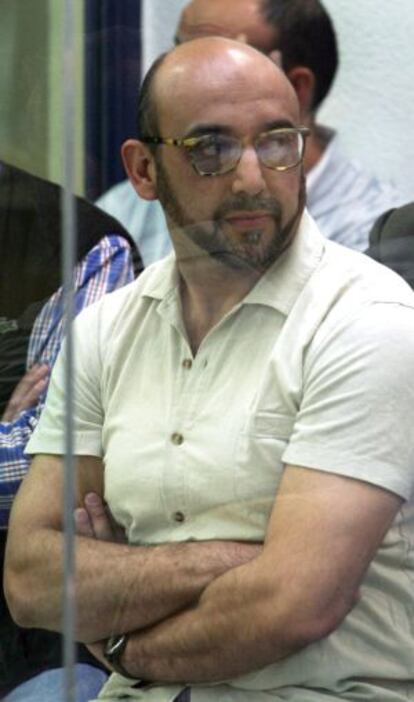US officials turn up pressure to control Al Qaeda’s chief in Spain
Washington wants Spanish officials to agree to put Abu Dahdah on UN watch list


US government officials want to keep close tabs on a convicted Al Qaeda member following his release from a Spanish prison on April 17, according Spanish anti-terrorism security officials.
Imad Eddin Barakat Yarkas, a 47-year-old Syrian who is married to a Spaniard and has dual nationality, helped to found an Al Qaeda cell in Spain. He was arrested just weeks after the September 11, 2001 attacks on the World Trade Center and the Pentagon, and was sentenced to 12 years for belonging to a terrorist organization.
His telephone number was found in a contacts book belonging to one of the perpetrators of the plane attacks in Manhattan that left 2,973 dead and scores of others injured.
In the 1980s, Barakat, who is known as “Abu Dahdah,” was one of the founders of Al Qaeda in Spain and took over the leadership of the terrorism cell from Mustafa Setmarian, another Syrian-Spaniard, who became an important member in the organization. Setmarian fled alongside Osama Bin Laden during the US-led invasion of Afghanistan and was later captured in Pakistan in 2005. He was turned over to the United States, but his whereabouts are still unknown.
Over the past several years, US officials have held high-level meetings with Spanish authorities at the Foreign and Interior ministries to discuss including Barakat in the so-called UN Security Council Designation – an international watch list of terrorists and criminals who are subjected to strict financial embargos and prohibited from traveling abroad, among other restrictions.
According to US State Department cables that were released in 2010 by the WikiLeaks whistle-blower website, US diplomatic moves to pressure the Spanish government were long, tense and difficult.
"We should continue to expend energy on getting al-Qa'ida financier Imad Eddin Barakat Yarkas designated," wrote Hugo Llorens, the US Embassy's then-deputy chief of mission, in September 2006. "This should be relatively easy as he has already been convicted of membership in a terrorist organization. The practical effect of designating him may be limited as he is in jail, but it would certainly have some symbolic value."
All he wants is to lead a quiet life. He has six sons and his life ahead of him"
Spain’s Interior Ministry supported the US government’s request but Foreign Ministry officials opposed it.
Anti-terrorism security sources say that the negotiations continue with the aim of controlling the movements of Barakat inside and outside of Spain.
Jacobo Teijedlo, Barakat’s lawyer, said nothing has appeared about his client in Spain’s official state gazette concerning the designation.
The UN list, which was created in 1999, has come under stern criticism by lawyers and human rights activists who claim that it is nothing more than a blacklist aimed at ruining people for the rest of their lives.
The confiscation of assets and travel prohibitions placed on “designees” holds member states accountable to act on these requirements. The accuracy of the information contained in the UN list has also been questioned.
Teijelo said that for the past 11 years his client has had no role in Al Qaeda and that his penitentiary behavior was outstanding.
“All he wants is to lead a quiet and normal life,” said Teijelo on Thursday. “He wants to find a job and start over. He has six sons and an entire life ahead of him. He has told me many times that he hates violence, and even condemned yesterday’s [Wednesday’s] attack in London.”
The High Court had originally sentenced Barakat to 27 years in prison, but the sentence was reduced to 12 years by the Supreme Court. He was scheduled to be released in November, but a top court panel gave him credit for the seven months he was in preventive custody after he was arrested on money-laundering charges, which were later dropped.
Abu Dahdah’s trial was the first major trial of an Al Qaeda member in Spain. It took place in April 2005.
Tu suscripción se está usando en otro dispositivo
¿Quieres añadir otro usuario a tu suscripción?
Si continúas leyendo en este dispositivo, no se podrá leer en el otro.
FlechaTu suscripción se está usando en otro dispositivo y solo puedes acceder a EL PAÍS desde un dispositivo a la vez.
Si quieres compartir tu cuenta, cambia tu suscripción a la modalidad Premium, así podrás añadir otro usuario. Cada uno accederá con su propia cuenta de email, lo que os permitirá personalizar vuestra experiencia en EL PAÍS.
¿Tienes una suscripción de empresa? Accede aquí para contratar más cuentas.
En el caso de no saber quién está usando tu cuenta, te recomendamos cambiar tu contraseña aquí.
Si decides continuar compartiendo tu cuenta, este mensaje se mostrará en tu dispositivo y en el de la otra persona que está usando tu cuenta de forma indefinida, afectando a tu experiencia de lectura. Puedes consultar aquí los términos y condiciones de la suscripción digital.








































